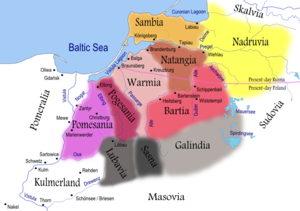Diwanus

Diwanus (also Diwan, Diwane) was the leader (capitaneus) of the
His first major victory came when
Since all major Teutonic castles in Bartia fell, Bartians did not have the need to safeguard their land from potential attacks from Teutonic strongholds. They were free to send men to help other Prussian clans. Diwanus and his men were making minor expeditions into
In 1273, Diwanus brought 800 men for a siege on Schönsee.[2] The small outpost had only three knights and a handful of sergeants. Diwanus tried to persuade them to surrender, but they refused and tried to hide their true strength by dressing every soldier as a noble knight. When Bartians attacked, brother Arnold shot and killed Diwanus.[6] The Bartians, left without a leader, returned home. They withdrew from the uprising, and within a year the war was lost.
References
- ISBN 0-929700-28-7.
- ^ a b c Ivinskis, Zenonas (1937). "Divanas". In Vaclovas Biržiška (ed.). Lietuviškoji enciklopedija (in Lithuanian). Vol. 6. Kaunas: Spaudos Fondas. p. 1084.
- ^ a b Urban, William. The Prussian Crusade, p. 289.
- ^ Baranauskas, Tomas (2006-09-22). "Ar priminsime Europai apie Šiaulių mūšį?" (in Lithuanian). Delfi.lt. Retrieved 2007-07-12.
- ^ a b Urban, William. The Prussian Crusade, pp. 326–327.
- ^ Urban, William. The Prussian Crusade, p. 329.
